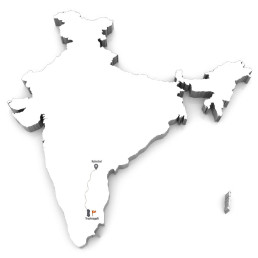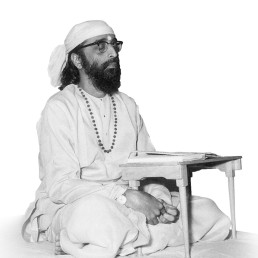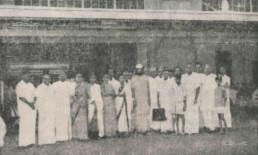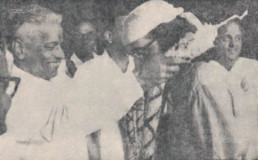
Jnana Yajna 87

Year & Dates:
May 27, 1961 to June 07, 1961

Yajna Topic:
Shrimad Bhagavad Gita- Chapter 5

Place:
Trichy (Tiruchirappalli), India
To act or not to act? To participate or renounce? That was the question that Arjuna had when chapter 5 of Shrimad Bhagavad Gita began. And, Bhagavan Shri Krishna advocates action first for most of the seekers who, like Arjuna, are yet to evolve to a greater stage of dispassion. Then having developed the balance and ability to rise above likes and dislikes through selfless doing, the path opens up to renunciation. From Karma Yoga to Karma-Sannyasa Yoga is the progression, assures Bhagavan, and explains the different attributes of one who strives for and obtains the highest freedom throughout chapter 5.
Choosing that important chapter as the main topic for His 87th Jnana Yajna, Pujya Gurudev arrived at the yajnashala at Thillai Nagar, Trichy, which had gained the repute of a “dharmakshetra” after Pujya Gurudev’s previous two yajnas in that location.
How to Do, Renounce, and Realize
With an enthusiastic crowd looking on respectfully, a Purna Kumbha welcome was offered on May 28th evening to Pujya Gurudev after which Sri. Pasupati, then secretary of Chinmaya Mission Trichy hoisted the Om flag. Dr. Kalamegham, the president of the yajna committee, welcomed Pujya Gurudev warmly and also informed the audience about the upcoming Sandeepany Sadhanalaya in Mumbai. As a flagship spiritual institution, the Vedantic College would carry out the Chinmaya vision of spreading the message of the Hindu scriptures across the land while demonstrating the Upanishadic way of life.
Pujya Gurudev, in His previous yajna at Trichy, had taught Kena Upanishad. In the 87th yajna, He chose to conduct morning classes on Ishavasya Upanishad which belongs to the Vajasaneyi branch of the Shukla Yajur Veda Samhita. One memorable way in which He explained the famous Shaanti Paatha, “ Om Poornamadah Poornamidam…” of the Ishavasya Upanishad was through the simple but vivid analogy of the “ghost in a post.” Like the “ghost rose in the post, remained in the post, borrowing its reality from the post, and it merged back in the end into the post,” Pujya Gurudev explained that the entire world of plurality was sustained by the Absolute Reality that remains Unchanged and Whole. With brilliant clarity, expounding verse-by-verse the Upanishadic theme of realizing the Oneness of the individual and the Infinite, Pujya Gurudev infused confidence in the modern seeking minds that the Upanishads were not abstract literature of the past but contained the most applicable approach to rediscover the true identity of the individual, the world around, and the supporting Supreme.
As We Reflect…The firm foundation of Vedanta that Pujya Gurudev laid by “nationalizing the Vaidika Heritage,” by daring to bring the Upanishads and the Gita within the grasp of the maximum is a monumental blessing that continues to transform the world of seekers.
Photo Gallery

“Think,” Says Pujya Gurudev
When through Karma Yoga a man has thus gained an inward peace, both at his mental and at his intellectual levels, it becomes child’s play for him to deny and to restrain, to control and to guide, his sense organs and their never-ending appetites. A seeker (Yogi) who has thus controlled himself on all these three different layers in him, namely, his body, mind and intellect, becomes the best fit for the highest meditation. In fact, all our obstacles in meditation are nothing other than the mile-stones of sensuous appetites, emotional agitations and desire-problems. When once these chains are broken down, it comes to the natural condition of high meditation, wherein the re-discovery of the Self must be instantaneous and complete.
This realization of the Self cannot be partial; it cannot be if the meditator understands himself to be exclusively Divine. To realize, Divinity of the Self is Infinite and All-pervading. From the innermost sanctum of the Spirit when he looks out, he realizes nothing but Divinity-everywhere, at all times. Therefore, the Lord says, that such a one, “realizes one’s own Self as the Self in all beings.”
From Tyagi Magazine
Merit (Punya) and Sin (Papa)
Actions are judged not by their nature but by the intent behind them; selfless deeds are virtuous while selfish ones are sinful. The Supreme Lord remains impartial to both good and bad deeds, as it is the motive that determines their moral value.


